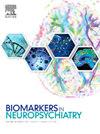Genetic predictors of attempted suicide among South Indian adolescents and young adults: A case-control study
Q2 Medicine
引用次数: 0
Abstract
Background
Suicide among adolescents and young adults is an alarming public health issue globally. Though studies suggest the link between genetic factors and suicidal behavior, there is a paucity of studies of specific genetic variants in adolescents and young adults. Hence this study explored the genetic predictors for attempted suicide among adolescents and young adults, by studying the genetic basis of serotonin and dopamine synthesis, transport, and degradation machinery.
Methods
A Case-control association study was conducted comprising individuals with attempted suicide (cases n = 80), 13–29 years of age, belonging to Malayalam speaking Dravidian population, and attending a tertiary care center in South India. Age, sex, and ethnicity matched controls (n = 267) with no history of attempted suicide were also considered from the same ethnic population. Genotyping was performed for functionally critical SNP in serotonin receptor, Tryptophan hydroxylase, Tyrosine hydroxylase, and Catechol-o-methyl transferase. Statistical significance for allelic and genotypic comparisons and their odds ratios were computed.
Results
The Tyrosine Hydroxylase THrs2070762 and Tryptophan Hydroxylase TPH1rs211105 genetic variants showed a statistically significant association with attempted suicide phenotype.
Conclusion
The study suggests that the genetic variants in Tyrosine Hydroxylase and Tryptophan Hydroxylase are predictive of attempted suicide among adolescents and young adults. Understanding the genetic variations will help in identifying and managing high-risk individuals.
南印度青少年和年轻人自杀未遂的遗传预测因素:一项病例对照研究
青少年和青壮年自杀是一个令人担忧的全球公共卫生问题。尽管研究表明遗传因素与自杀行为之间存在联系,但对青少年和年轻人中特定基因变异的研究却很少。因此,本研究通过研究血清素和多巴胺合成、转运和降解机制的遗传基础,探讨了青少年和年轻人自杀未遂的遗传预测因素。方法采用病例-对照关联研究,纳入13-29岁,属于马拉雅拉姆语德拉威人,在印度南部三级保健中心就诊的自杀未遂个体(病例n = 80)。年龄、性别和种族匹配的对照组(n = 267)也被认为来自同一种族的人群,没有自杀未遂史。对5 -羟色胺受体、色氨酸羟化酶、酪氨酸羟化酶和儿茶酚-o-甲基转移酶的功能关键SNP进行基因分型。计算等位基因和基因型比较的统计学显著性及其优势比。结果酪氨酸羟化酶THrs2070762和色氨酸羟化酶TPH1rs211105基因变异与自杀未遂表型有统计学意义。结论酪氨酸羟化酶和色氨酸羟化酶基因变异可预测青少年和青壮年自杀未遂。了解遗传变异将有助于识别和管理高风险个体。
本文章由计算机程序翻译,如有差异,请以英文原文为准。
求助全文
约1分钟内获得全文
求助全文
来源期刊

Biomarkers in Neuropsychiatry
Medicine-Psychiatry and Mental Health
CiteScore
4.00
自引率
0.00%
发文量
12
审稿时长
7 weeks
 求助内容:
求助内容: 应助结果提醒方式:
应助结果提醒方式:


